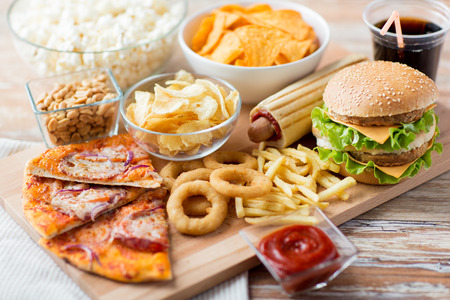Staying on track with healthy eating is extremely challenging. We live in a food-centric society and are required to make food decisions all day. Most of the food available is unhealthy and the portions are too large.
Are you sabotaging your healthy diet?
Many times we aren’t staying on track with healthy eating due to self-sabotage.
Do you justify straying from your healthy diet with thoughts like these?
• “I’ve just been for a run so I can eat a pizza.”
• “It’s been a long hard week at work. I deserve to relax and eat what I want on the weekend.”
Does this sound like something you would say? There is nothing wrong with either of these sentences; however, if you are really trying to lose weight and stick to a diet plan, they are forms of self-sabotage.
Why would you sabotage yourself if your diet is going well? It seems counter-productive, right? Well, if you’re successful, it may lead you to face several fears.
Food can be an escape, a reward, or a way to deal with your feelings. Suppose you remove the self-sabotage tactics, and therefore the option to fall back on food. In that case, it can lead to facing some difficult situations and emotions.
A diet won’t fix underlying problems, but it can sometimes highlight other areas of your life that you need to deal with. It may be that you sabotage your diet without realizing it affects your goals. If you really want to succeed with your long-term diet goals, then here are seven common ways we typically self-sabotage and some tips to turn these practices around.
Tips for Stopping Self-Sabotage and Staying on Track with Healthy Eating
Here are seven ways you may be self-sabotaging yourself and advice about staying on track with healthy eating.
You skip meals
Surely it’s simple. You skip a meal, meaning you eat fewer calories, and therefore your diet is successful, right? Wrong. When you skip meals, you are much more likely to become very hungry and then end up overeating/binge eating. You also naturally slow down your metabolism, causing weight gain making it hard to lose weight.
FIX – Starvation is not the answer. Try to eat every 2-3 hours to keep hunger at bay and fuel the body to burn fat. Pre-prepare healthy snacks to reach for in between meals so that you don’t grab something unhealthy or binge eat.
Binge eating on the weekend.
Binge eating on the weekend can be a difficult cycle to break. It’s very easy to relax away from your diet and reach for treats when you have had such a positive week. However, this hinders your progress, and you take one step forwards and two steps back.
FIX – Don’t deny yourself treats but know the calories and impact of your choices. Can you choose a healthier treat or cut down on your alcohol intake? Order the steak at a restaurant but swap the fries for a salad. Can you spread the treats over the week so that you don’t feel the need to binge on them on the weekend? The odd sweet treat throughout the week won’t hinder your progress, and it will stop sugar cravings. It also helps to do your weekly weigh in on a Friday to spur you on to eat well when you see the positive results.
You are too focused on your weight
Speaking of the weekly weigh-in, try not to weigh yourself more than once a week. Your weight will fluctuate throughout the day and from day to day. Weighing yourself more than once a week does not give you an accurate representation of weight loss and can demoralize you for no need.
FIX- Set a time and a day, once a week, to weigh yourself with no clothes on. Morning is the best. This will give you an accurate trend of your weight loss. As mentioned above, doing it before a weekend can give you that extra boost to stay healthy.
Advertising gets the better of you
Do you read the catchy health claims on food packaging without looking at the nutritional values? We are all guilty of falling for the advertising of healthy foods, especially when in a hurry. However, packaging can be misleading and not truly represent the nutritional content.
FIX- Become comfortable with reading food labels and the nutritional content of ready-made food. Look at the calories, fats, and salt in the food. Even better, pre-prepare your meals or snacks at home so that you know exactly what is in them.
You give up at the first hurdle
You’ve had a healthy morning, but your colleague brings donuts into work, and you can’t resist having one. Well, since you’ve had one donut, you might as well give up and eat what you want for the rest of the day. Start again tomorrow. Does this sound familiar?
FIX- You can’t change what you have already done, but you can control your choices for the rest of the day. Try not to become emotionally attached to food. There is no need to feel guilty. Accept the fact that you had a treat and enjoy it. Make good choices for your ongoing meals, and perhaps cut out a few calories elsewhere. It’s not a big deal! One treat is not going to send you off track, but a whole day of treats will.
Using exercise as a reward or punishment
Overeating after exercising, or punishing yourself with exercise after you overeat, is an unhealthy and vicious cycle. It will only lead you to feel unhappy or burn out.
FIX- You need to find balance and understand why you overeat. Get to the root cause of the problem. Ensure you eat regularly (don’t go more than 2-3 hours without eating). Make sure you have enough protein in your diet to give you the energy to exercise and identify any emotional problems causing you to overeat.
You don’t give your habits time to get established
It can seem challenging implementing a new diet regime, and more often than not, we give up after a week or two. However, you have to give yourself time to get used to your new routine. It takes 66 days for a behavior to become a habit. Over two months!
FIX- Quite simply, give it time. Make your dietary changes easy to implement so that it is not difficult to maintain them. Over time, they will become a habit, and it will all seem much more manageable. Try not to make too many changes at once as it can be overwhelming. It is much easier to change one small thing at a time, so it becomes successfully ingrained into your lifestyle.
Click here to read about staying on track with healthy eating.







